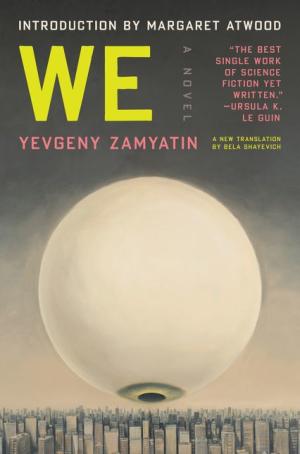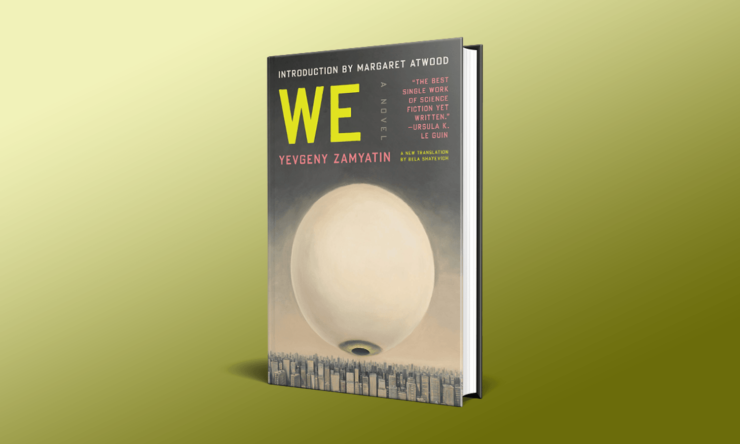Nothing good can come of a society which celebrates a holiday called the “Day of Unanimity.” At least, that’s a logical conclusion to draw when you’re on the outside of said society looking in. Unfortunately for D-503, the narrator of Yevgeny Zamyatin’s 1920 novel We, few people are more on the inside of their society as he is. Unlike his poet friend R-13, D-503 is a mathematician by trade—and when one lives in a society where everything has been quantified, down to something as ineffable as the human soul, that suggests a rude awakening waiting to happen.
Since its publication over a century ago, Zamyatin’s novel has picked up a number of high-profile admirers—Ecco’s edition of this new translation by Bela Shayevich features reprinted writings on We by George Orwell and Ursula K. Le Guin. In a blog post from 2015, Le Guin described the setting of We as “an enclave of maximum control surrounded by a wilderness.” This is the One State, a society ruled by The Benefactor and on the verge of launching a mission into outer space on a ship, the INTEGRAL.
It’s worth mentioning here that the government of the One State is fond of communicating in all caps, which is another hint that not all is well. “SOME THOUSAND YEARS AGO, YOUR HERO ANCESTORS VICTORIOUSLY SUBJUGATED ALL OF EARTH TO THE ONE STATE,” their first dispatch reads—and goes on to hail the benefits of “MATHEMATICALLY INFALLIBLE HAPPINESS.” As for what the precursor to this society looked like, our narrator offers tantalizing details, including references to the Two Hundred Years’ War and a brief mention of “the greatest surviving classic of ancient literature”—namely, The Train Schedule.
Buy the Book


We
D-503 is the “Builder of the INTEGRAL,” and the novel is structured as a series of log entries as he documents his life leading up to the launch of the ship in question. Gradually, however, D-503 begins to feel out of step with the larger society around him; at one point, he compares his feelings to asking a square “to tell you about itself and its life.” He begins to become dissatisfied with his society’s system of managing sex between citizens and learns that the One State might not be as all-encompassing as he’d once believed.
Later still, D-503 observes that “[f]reedom and crime are as inextricably linked as… well, the motion of an aero and its velocity.” And throughout the book, he torments himself with the dilemma of whether to confess or embrace his heretical thoughts. The idea of someone raised to believe in absolute rationality having an emotional thaw propels the action of We forward. It’s not hard to see the impact that this book has had on an entire genre — the Orwell essay contained in this edition makes a convincing argument for We as a precursor to Brave New World, and there are other aspects of this novel that anticipate elements of narratives ranging from The Prisoner to A Canticle for Leibowitz.
Not all aspects of this book look so far-sighted, however. D-503’s descriptions of his poet friend R-13 come off as shockingly racist throughout the novel, to the point where translator Shayevich adds a footnote to comment on this element of the book. To wit: Zamyatin is likely establishing a comparison between R-13 and Alexander Pushkin—both poets of African descent—but does so in an offensive and heavy-handed manner. Shayevich’s explanation is helpful when it comes to the context in which Zamyatin was writing, but it doesn’t make the repeated physical descriptions of R-13 any less cringeworthy to read.
What stands out most sharply in this book and its new translation are D-503’s sense of self and corresponding alienation. “I see myself clearly, distinctly, consciously, astonished to be aware of myself as some ‘he’,” D-503 thinks at one point when looking at himself in the mirror. That his interactions with a woman named I-330—whom he often refers to simply as “I”—help spark his own questioning of the world around him adds another layer to his alienation. In this narrative, “I” really is someone else.
D-503’s dilemma throughout the book is both physical and existential, and the society in which he lives offers the threat of intellectual and theological torments. Much of what’s so effective about We, even now, comes from the sense of an ordinary person suddenly grappling with a truth about their world that they can barely comprehend. It’s not without its flaws, but the sense of dread that rises when reading this book in 2021 helps explain why it’s endured for so long.
We is available from Ecco.
 Tobias Carroll is the managing editor of Vol.1 Brooklyn. He is the author of the short story collection Transitory (Civil Coping Mechanisms) and the novel Reel (Rare Bird Books).
Tobias Carroll is the managing editor of Vol.1 Brooklyn. He is the author of the short story collection Transitory (Civil Coping Mechanisms) and the novel Reel (Rare Bird Books).










